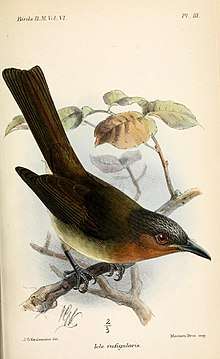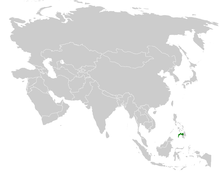Zamboanga bulbul
The Zamboanga bulbul (Hypsipetes rufigularis) is a songbird species in the bulbul family, Pycnonotidae. It is endemic to the Philippines, where its natural habitat is subtropical or tropical moist lowland forests of Basilan and the Zamboanga Peninsula. It is becoming rare due to habitat loss.[2]
| Zamboanga bulbul | |
|---|---|
 | |
| Illustration by Keulemans, 1881 | |
| Scientific classification | |
| Kingdom: | Animalia |
| Phylum: | Chordata |
| Class: | Aves |
| Order: | Passeriformes |
| Family: | Pycnonotidae |
| Genus: | Hypsipetes |
| Species: | H. rufigularis |
| Binomial name | |
| Hypsipetes rufigularis (Sharpe, 1877) | |
 | |
| Synonyms | |
| |
Taxonomy and systematics
The Zamboanga bulbul was originally described in the genus Hypsipetes and later placed in the genus Ixos. Formerly, some authorities classified the Zamboanga bulbul in the genus Iole and also considered it to be a subspecies of the Philippine bulbul. In 2010, it was returned to the genus Hypsipetes.[3]
Footnotes
- BirdLife International (2016). "Hypsipetes rufigularis". IUCN Red List of Threatened Species. 2016: e.T22713182A94363832. doi:10.2305/IUCN.UK.2016-3.RLTS.T22713182A94363832.en.
- BLI (2008)
- "Species Version 2 « IOC World Bird List". www.worldbirdnames.org. Retrieved 2017-11-03.
gollark: Hold on, the search is quite bad.
gollark: It is? Must be an accident.
gollark: We can quarantine it such that it will receive 0 (zero) messages from <#733816666089062511> and other busy channels and thus reduce your traffic requirements.
gollark: Hello!
gollark: unfathomable bugs on my side.
References
- Gregory, Steven M. (2000): Nomenclature of the Hypsipetes Bulbuls (Pycnonotidae). Forktail 16: 164–166. PDF fulltext
- Moyle, Robert G. & Marks, Ben D. (2006): Phylogenetic relationships of the bulbuls (Aves: Pycnonotidae) based on mitochondrial and nuclear DNA sequence data. Mol. Phylogenet. Evol. 40(3): 687–695. doi:10.1016/j.ympev.2006.04.015 (HTML abstract)
- Pasquet, Éric; Han, Lian-Xian; Khobkhet, Obhas & Cibois, Alice (2001): Towards a molecular systematics of the genus Criniger, and a preliminary phylogeny of the bulbuls (Aves, Passeriformes, Pycnonotidae). Zoosystema 23(4): 857–863. PDF fulltext
This article is issued from Wikipedia. The text is licensed under Creative Commons - Attribution - Sharealike. Additional terms may apply for the media files.
